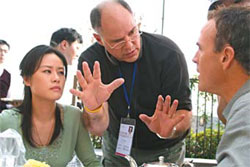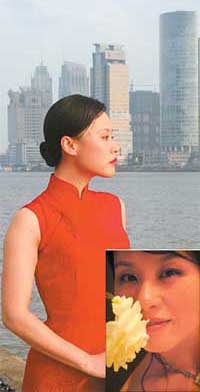
Vivian Wu and her husband Oscar L. Costo
(center) team up for the first time in a movie. |
Vivian Wu (Wu Junmei) describes her latest offering Shanghai Red
(Shanghai Hong Meili) as "a work of family labor of love". Her
husband Oscar L. Costo who wrote and directed the film, considers
it at first a love letter to his wife.
"It has always been an ideal for me to work with Vivian in her
hometown," said Costo. "When I finished the first draft of the
script, I handed it to her and could not help crying for no
reason."
The movie, which premieres on Saturday, tells the story of an
ambitious Shanghai woman who pushes her husband hard to make more
money and pays dearly for her desire.
Costo, who met Wu in 1994 when she starred in Vanishing
Son, a TV drama he produced, married her two years later. The
fact that his wife is a Shanghai lady was one of the reasons he set
the story in the metropolis. Yet he emphasized the movie is in
essence a universal story that could happen to any person in any
place in the modern world.
"It is a story about men and women in the modern world, who push
and push and push to make more money and pay a price for it," he
said. "Shanghai is chosen because it is one of the most
representative among the modern cities experiencing great
changes."
Costo made his first journey to Shanghai in 1994. At 4:30 AM, he
opened the window of his hotel room. He saw what he called "energy
of life". There were so many people playing taichi, and bicycles up
and down on Nanjing Road. "You can see the full of complexity of
life."
But when he came to the city again in 2003, what he found was it
had transformed so amazingly in the 10 years. What he saw from the
same window was only two or three people playing taichi, no
bicycles, and only cars on the Nanjing Road.
The complexity of life was vanishing, said Costo.
And Wu who left the city for America in 1987 after starring in
Bernardo Bertolucci's The Last Emperor, agrees. She could not get
around the city as easily as Costo, because it has changed so
much.
"Shanghai has been Westernized so much," she said. "The
environment, people, everything is not like what I knew as a
child."
The story of Meili, heroine of the movie, is set against this
great transformation of the city and its people.

Wu Junmei stars in the movie Shanghai Red
(Shanghai Hong Meili). |
Significant as the message the couple want to convey is, the
picture is also an embodiment of love between the two and the whole
big family.?
This is the first time Wu and Costo teamed up in a movie. And
Wu's mother Zhu Manfang, a famous actress in the 1940s and 50s, is
part of the cast and the associate producer. She contributed half
of the furniture in her apartment to the crew, who tried best to
reach the authenticity of a typical Shanghai house.
The digital processing staff were asked by Costo to sit in Zhu's
house while all the lights were turned off, to observe the outdoor
neon lights' reflections on the furniture and capture the details
of the decoration to represent a convincing Shanghai residence.
There is one scene in the movie of Meili's son playing with toys
which were actually made by Wu's father Wu Chengye, a retired
university teacher.
Wu's grandfather, 97, is always an inspiration for Costo, who
often jokingly told Wu that he married her only because of her
grandpa.
The old man does research on the Internet every day and speaks
perfect English. In Costo's eyes, the old man is a beautiful
example of those connected to modernization.
There were challenges, too, besides the romance and family labor
of love, such as Wu balancing her role as the leading actress and
the producer.
Things often went as wrong, like when she got ready to perform,
somebody would ask: "What should we do? The camera broke down!" She
would have to forget about acting and deal with the emergency
first.
Fortunately she was more adept at multi-tasking than she and
Costo thought. "She was able to shift from one role to the other,"
said Costo. Wu made sure that the project ran to budget and her
performance, according to Costo, is one of her best to date.
Established Chinese comedian Ge You and rising actor Sun Honglei
co-star with Wu. Costo loved Ge's pervious work in To Live
(Huo Zhe) and Farewell My Concubine (Bawang
Bieji) and had long been looking forward to casting him.
Costo said that a Chinese audiene may find it interesting to see
Shanghai hot from a Westener's perspective. "Maybe I don't
understand China that well, because I am not a Chinese director,"
Costo said, "but I offer a certain observation from a Westerner's
view."
(China Daily April 30, 2007)